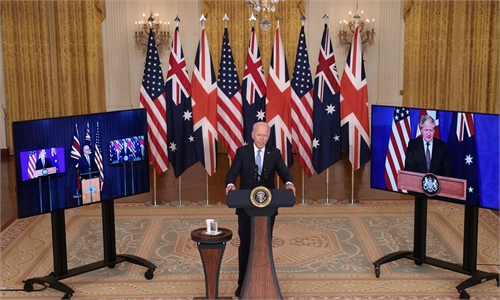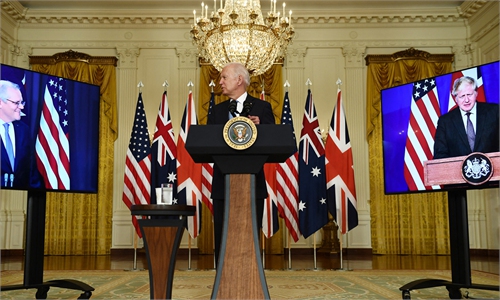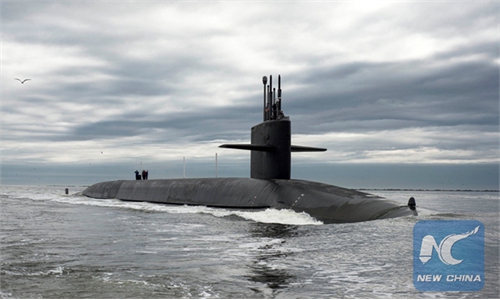AUKUS deal to continue causing repercussions in transatlantic ties
EU to avoid being too close to US on core interests of China, Russia: expert
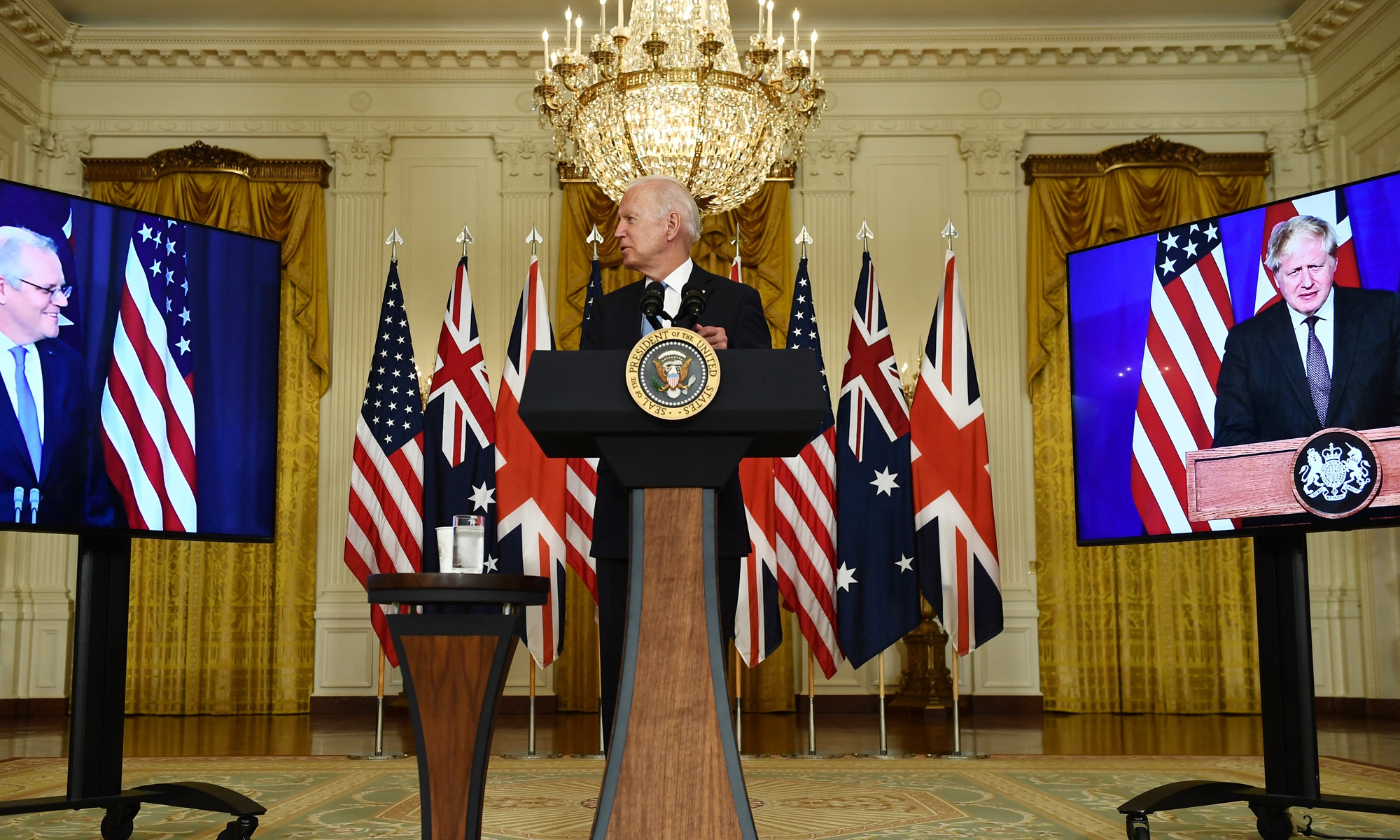
US President Joe Biden participates in a virtual press conference on national security in the White House in Washington, DC, on Wednesday US time, with British Prime Minister Boris Johnson (right) and Australian Prime Minister Scott Morrison in attendance via video link. Biden announced that the US is forming a new Indo-Pacific security alliance with the UK and Australia. Photo: AFP
Although US President Joe Biden always shouts loudly his slogan for diplomacy "America is back," Washington is facing an increasing crisis of trust in ties with other countries, especially with its allies, as the AUKUS nuclear submarine deal between Australia, the UK and the US has seriously harmed US-France ties and brought unprecedented consequences as Paris recalled its ambassadors to the US and Australia.
Some Chinese analysts said on Tuesday that Biden has just proved that "he can do better than Donald Trump, especially in ruining US ties with allies." People used to believe that Trump was the US President who inflicted most damage on transatlantic ties and Biden would repair them, but now Biden has done something even worse - inflicting more damage by betraying allies, but keep cheating them by saying "America is back."
French Foreign Minister Jean-Yves Le Drian used the words "duplicity, disdain and lies" to describe the US' behavior. Experts said that the key reason behind the duplicity is the decline in US overall strength and more selfishness in Washington. The long-existing obsession in American exceptionalism, hegemony and unilateralism deep in the minds of US elites has made the US unable to avoid an increase of frictions with not only its "competitors" like China and Russia, but also with its allies.
It is not about Biden or Trump, Democrats or Republicans, it is a problematic and hegemonic order that the US built and forced others to obey, and the fundamental conflict lies in this order and other countries' unwillingness to follow, experts said.
In the first year of Biden's term, the US has already betrayed many allies and partners, including the former Afghan government and other Western countries that joined the US war in Afghanistan, and France. Experts noted that France will not be the last, as every US ally could be betrayed anytime as long as Washington believes it is necessary.
'EU won't be fooled'
The recall of the ambassadors "signifies the force of the crisis today" between the French government and Washington, Canberra, the French foreign minister said in an interview on France 2 television. He said it was "the first time ever" that France, the United States' oldest ally, has recalled its ambassador to the US, the AP reported on Sunday.
On Monday, White House press secretary Jen Psaki told reporters that the White House is still working on scheduling a call between Biden and French President Emmanuel Macron, as the US President wants to pacify the angry ally.
Before the AUKUS partnership and the nuclear submarine deal was announced, the US did not inform France nor attempted to offer other benefits to France to offset the damage to at least minimize the impact on US-France ties.
Lü Xiang, a research fellow and an expert on US studies at the Chinese Academy of Social Sciences, told the Global Times that "the US knew it would surely offend France, but to some extent, US elites don't care. Maybe they thought the anger of Paris is not a big deal, compared to the benefits they can get from the sub deal."
Many senior Biden officials are actually brokers that serve the interests of the US military industrial complex and can get huge benefits from the overseas military operations and arms deals, like Secretary of State Antony Blinken for instance, said Lü, noting that by ruining the submarine contract between France and Australia, those political elites can get huge benefits, so they do not really care about the reputational damage.
"The damage that the Biden administration has brought to US-France ties is much bigger than all the damage combined in Trump's term," said Diao Daming, an expert on US studies and associate professor at the Renmin University of China in Beijing.
This proves that whether "America First" or "America is back," they are just different measures serving the same goal of US hegemony. Biden's pledge to fix ties with allies is not the purpose, it is a measure to make the US regain leadership, Diao noted, stressing that "in the case of the AUKUS submarine deal, Biden's diplomatic approach is just like another version of Trump's America First. As long as it's in the interest of the US, they can betray anyone, even an ally like France."
US allies and partners are in different classes in the eyes of Washington, said Chinese analysts. Anglo-Saxon English-speaking countries, or the Five Eyes Alliance, are at the core, while Australia and the UK are much closer and more active than Canada and New Zealand. Those hosting US troops and military bases but having no common cultural backgrounds and ethnic identity will be less trustworthy as sometimes Washington can effectively affect their decision-making, such as Japan and South Korea, and those with no US military bases but having independent decision-making in many affairs, and only sharing common Western political values, like France, are untrustworthy and could be betrayed.
"So the change that Biden brings is not to make the relationship between the US and its allies more equal, or give them more respect, but to use another measure to maintain US supremacy in the international community," Diao said.
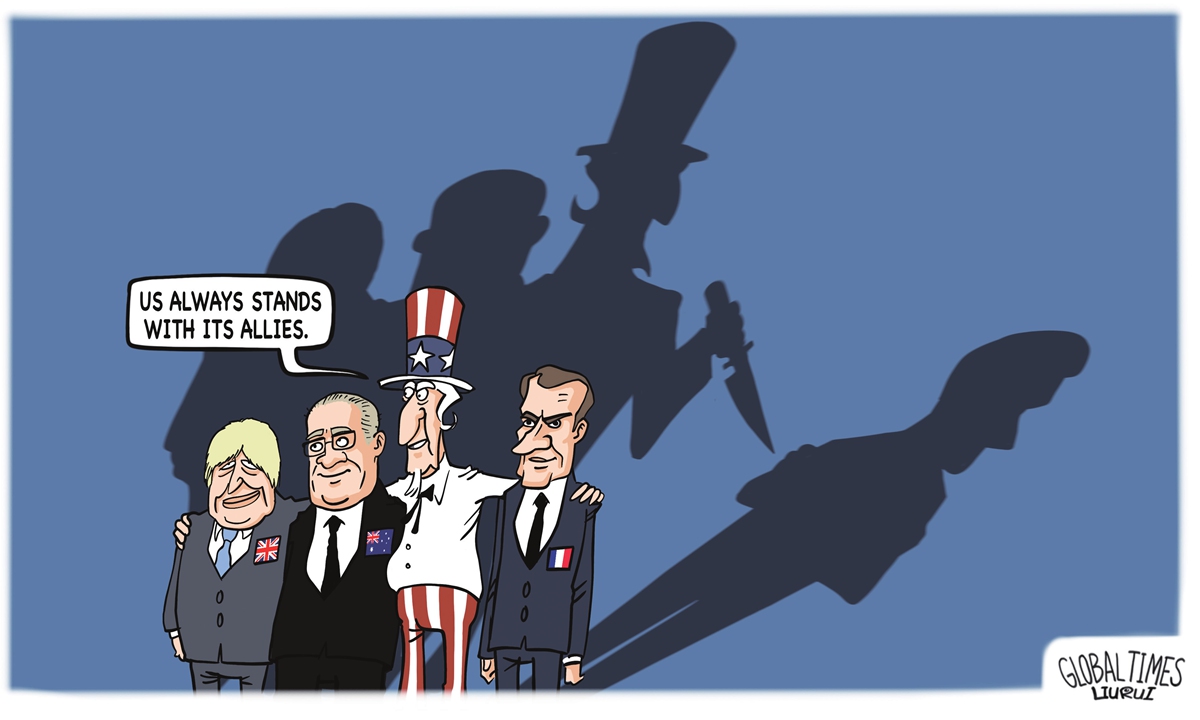
Illustration: Liu Rui
More to come?
CNN, which is relatively supportive of Biden and hostile to Trump, ran a harsh headline to remind the US President on Tuesday that his biggest challenge at the moment is to "convince allies he's not another Trump."
Lü said CNN is still being too kind, noting that "the headline should be 'Biden should convince others he's not worse than Trump.'"
Cui Hongjian, director of the Department of European Studies at the China Institute of International Studies, told the Global Times on Tuesday that in next stage, the US might want to pacify European countries that the AUKUS partnership is just a beginning, and there will also be cooperation between the US and the EU, and that the US will try to be as fair as possible.
But core EU members like France and Germany are not foolish and understand the US will not trust them and can betray them if necessary, so keeping a distance with the US will be an increasing consensus among the EU members. They will make strategic adjustments to review the relationship with China and Russia and reevaluate the necessity of being too close to Washington on matters related to China and Russia's core concerns, said Chinese analysts.
Wang Yiwei, director of the institute of international affairs at Renmin University, said other US allies like Japan are paying close attention to the latest incident, and those with no alliance treaty but who want to be a close partner of the US, like India, should also be careful, because the US can betray or abandon them as well. Standing too close with the US, or being hostile to China to please the US is never a wise choice.

